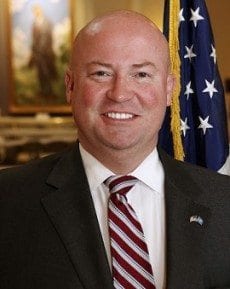BY JOE DORMAN
 A proposal was suggested last week by Gov. Mary Fallin and cabinet members to bring the Oklahoma Legislature back into session to allocate a much-needed pay raise for our state’s educators. While this sentiment is something supported by a strong percentage of Oklahoma voters, the method offered fell flat with most policymakers and Oklahomans alike.
A proposal was suggested last week by Gov. Mary Fallin and cabinet members to bring the Oklahoma Legislature back into session to allocate a much-needed pay raise for our state’s educators. While this sentiment is something supported by a strong percentage of Oklahoma voters, the method offered fell flat with most policymakers and Oklahomans alike.
Gov. Fallin suggested the funds remaining in the budget, about $140 million, should be allocated this year by legislators in a special session. This would fulfill one of her campaign promises from 2014 and something she suggested in her 2016 State of the State address.
Normally, this would be met with much excitement and would likely receive overwhelming approval. The problems lie with where these funds came from and the timing of the suggestion.
The state faced multiple revenue failures in the past fiscal year due to a downturn in the oil and gas sector of the economy and the many tax cuts which have been passed in recent years by the Legislature. Due to this, budgets have been cut each of the recent years of her administration.
In the past fiscal year, shortfalls were experienced when the budget did not meet anticipated collections, therefore requiring monthly adjustments. As each of these revenue shortfalls occurs, state agency budgets are decreased without much warning.
The final cut administered to state agencies was in excess of what needed to be cut, which resulted in remaining funds.
While some policymakers were overjoyed that government was cut even further, the result of that reduction led to the termination of jobs for state employees in many agencies and drastic cuts to many programs, such as children’s services.
Teachers immediately pushed back on this idea. The thought of receiving a pay raise as a result of other state employees’ termination notices was less than enthusiastic.
Flaws in the scheme also began to come forward. The money available comes from a one-time adjustment to an annual fiscal budget bill. There is no guarantee this funding will be available since this was not allocated by the appropriations bill as a set annual plan with future forecasting.
Having served as a legislative staffer prior to elective office in the state House, I saw the work put into our fiscal staff to not only get a budget which would meet the needs of the state, but to also anticipate what might happen in the future so as to not over-commit on recurring costs.
On another point, it is questionable legally whether a small group of politicians can slash more than was necessary from a budget bill passed by the Legislature and signed by Gov. Fallin. The Oklahoma Constitution spells out that the authority to pass a budget is the responsibility of the Legislature with approval by our chief executive.
For a small group to determine they have the authority to cut more than necessary from the budget should frighten many Oklahomans about the precedent this could establish.
The timing is also a bit suspicious as we are within the final 100 days before the election and the political pundits indicate many incumbents might be in trouble. Many policies passed at the state Capitol, perceived to be anti-education, have met increasing resistance and have motivated some Oklahomans to make a difference this year.
While the governor claims this is not the case, one must believe her advisors recognize they are facing the potential of major upsets in the elections this year with many incumbents facing tough challengers campaigning on better education policies and responsible budget decisions.
We saw three Republican incumbent legislators lose, with others in very close races in their primary elections. This is, in part, due to educators and the parents of their students mobilizing in this election cycle to work for candidates.
A social media group spearheaded by these education-minded voters has “upset the apple cart” by increasing anxiety in the political power structure through awareness of where candidates stand on issues. These engaged citizens have realized the power rests in the hands of the voters who needed the motivation and encouragement to go to the polls.
It is understandable why the majority party would want to pander to these educators and parents. The question is, will it work to soothe their anger, or will we see more incumbents lose in November due to not bringing teachers a figurative apple in the form of more respect through policy when they had the chance?
– Joe Dorman served District 65 as a state representative for 12 years and was the 2014 Democratic nominee for governor. He is the currently the community outreach director for True Wireless and a member of the Rush Springs Town Council.








